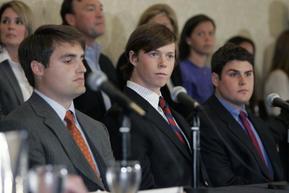 Drew Chegash Staff Writer In Mar. of 2006, three young college men were involved in a scandal that captivated the entire country and has ultimately split Durham since. On Mar. 13, ESPN released yet another one of its well acclaimed 30 for 30 episodes “Fantastic Lies”, which outlines the Duke Lacrosse rape case that happened on March 13, 2006. This case was the perfect storm for the media to self-indict three young Duke students before they were ever found guilty. Riots sparked from all forms of life and drew a clear barrier across the country. On the night of March 13, 2006, some Duke Lacrosse players decided to throw a party, which consisted of alcohol, and two “exotic dancers.” One dancer, Crystal Mangum, an African-American twenty-eight year-old mother of two, accused three players of allegedly raping her during the party. The three players were Dave Evans, Reade Seligmann, and Collin Flannerty. As a result, Durham’s racial tension snapped, and according to News & Observer columnist Ruth Sheehan, the allegation was like a “Molotov Cocktail that landed in the community.” It was seemingly obvious that these party-going, privileged, white, and young lacrosse players were without a doubt guilty of the horrible crime. The media jumped on this case quickly, releasing articles that misled the public to believing these young men were guilty. As a result, riots based on race, gender, and culture were sprawled throughout Durham, dividing the city. The magnitude of this case shed light on many issues that the city of Durham residents had with the proclaimed “Harvard of the South,” Duke University. When one of the accused players Dave Evans was incited on rape charges, even his lawyer, Bran Bannon, thought he was guilty. “I had absolutely no problem believing that rich, white, elite young men would take advantage of a young African-American woman that they had hired to come and perform for them,” recalled Bannon.
But as the case dragged forward, with Mangum changing her story many times, the idea that maybe these students did not actually commit the crime began to circulate. Things got suspicious when District Attorney, Mike Nifong released “DNA evidence” proving that the students were in fact in the right place at the time of the rape even though phone records and surveillance cameras suggested otherwise. After throughout research was conducted on the 2500 page stack of DNA evidence the Nifong provided, it was found that most of it was heavily skewed and that much of it was being withheld from the trial. It was also found that the men conducting the DNA test left more DNA than the entire Duke Lacrosse team combined. On April 11, 2007 all charges against Evans, Finnerty, and Seligmann were dropped. At that point the wheels had really fallen off for Mike Nifong as he was jailed for twenty-four hours and disbarred for violating more than a dozen ethics rules in prosecuting the case against the now-exonerated players, including withholding evidence. On April 3, 2011 the accuser Crystal Mangum stabbed her boyfriend and was sentenced to a minimum of fourteen years in prison. Where are the accused now? Dave Evans, the only senior involved, now works at Apax Partners, a private equity and capital firm, as a senior associate on the consumer team. Reade Seligmann transferred to Brown following the trial and then attended law school at Emory University. He now works as a clerk at the U.S. District Court in New Jersey. Collin Finnerty also transferred to Loyola College in Maryland. Today, he works as an analyst at Deutsche Bank. Both Seligmann and Finnerty continued playing lacrosse at their new schools, each serving as co-captains of their teams their senior year. Although it has been ten years since the accusation, the case will resonate in the eyes of the public forever. Comments are closed.
|
Archives
March 2017
Categories
All
|

